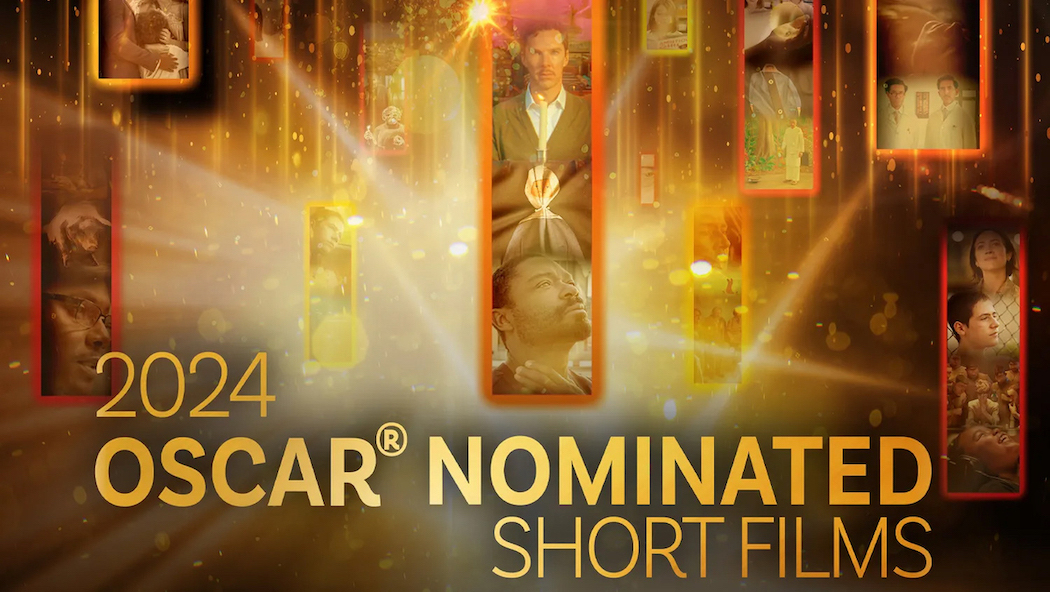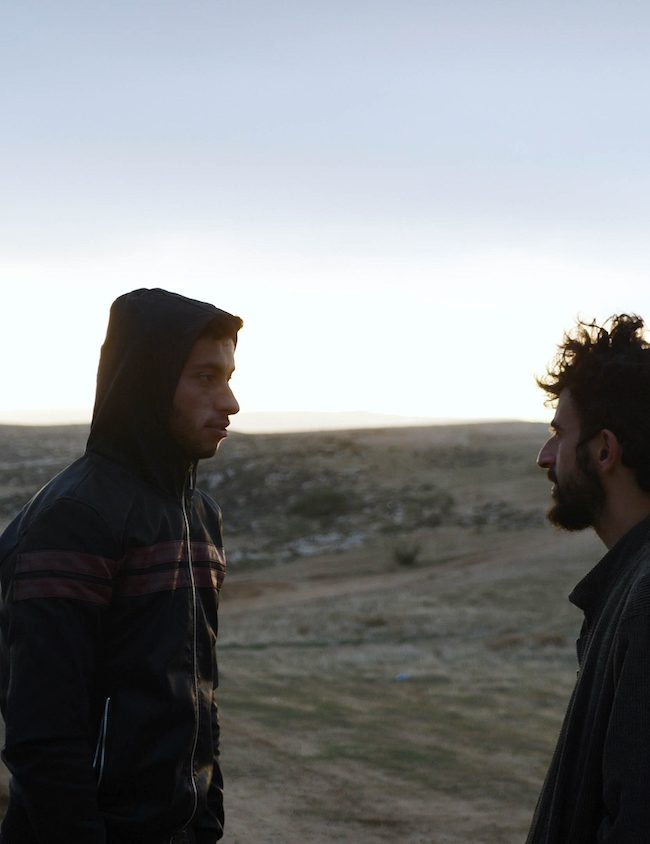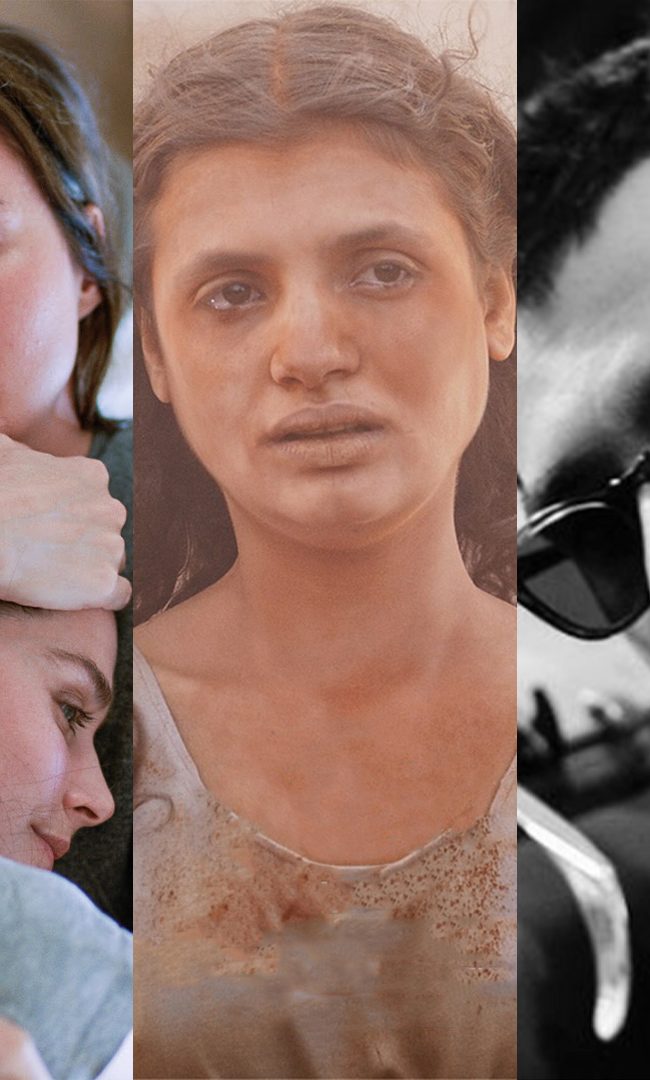2024 OSCAR-NOMINATED SHORTS

The 2024 Academy Awards take place on Sunday, March 10, and as usual there are 15 nominated short films across three categories: animation, documentary, and live action. As I do every year for Hammer to Nail, I watch all of them —which have been available for theatrical viewing in some markets since February 16, courtesy of ShortsTV—and then offer my thoughts on which are the best (to me). I am no Oscar prognosticator, however, so expect nothing in the way of predictions about which will win.
As is so often the case, my favorite category this year was the documentary one, with my top three non-fiction films all virtually tied for first place and the other two not that far behind. They are all of high quality. Next up is animation, where two of them vie for the top spot, with the next one a little behind, the one after that more so, and the fifth a distant last. My least favorite category overall, this time around, is live action, which has the one film of the bunch that I actively disliked, though the four others in that group prove worth watching, to varying degrees. What follows are my capsule reviews of everything, in order of category and film preference.

Oscar-Nominated Doc Shorts 2024
DOCUMENTARY
The Last Repair Shop (Kris Bowers/Ben Proudfoot, USA, 39 min.)
If I have a favorite among the documentaries, it’s this one, though the next two are more or less tied for first place, as well. Veteran film and TV composer Kris Bowers (Origin) joins forces with the winner of the 2022 Oscar for Best Short Documentary (for The Queen of Basketball), Ben Proudfoot, to deliver The Last Repair Shop, a profound exploration of the power of music, art, and altruism to make a major difference in young people’s lives. On all people, really, though the impact on youth will last a lifetime. We follow four craftspeople who repair musical instruments for the Los Angeles Unified School District, which has a fully supported mandate to supply instruments in working order to all students in need. The four are Dana Atkinson, Paty Moreno, Duane Michaels, and Steve Bagmanyan, each of whom have moving stories of their own. What motivates them today, however, is the joy they bring to children, many of whom we also meet. Full of cinematic delights, this movie sings.
The ABCs of Book Banning (Sheila Nevins, USA, 27 min.)
Longtime documentary producer Sheila Nevins steps behind the camera as director to bring us The ABCs of Book Banning, in which she takes on the present-day American mania for banning books in schools. Nevins mostly trains her camera on the children so affected, asking selected groups of them to read some of the forbidden texts and then offer their thoughts. These are books about race, racism, LGBTQ themes, and more, all written at grade-appropriate levels. The children are displeased, to say the least, that someone, somewhere, has decided that they should not be able to learn about these topics. We also meet the 100-year-old Grace Linn, whose husband died during World War II, as she protests the bans at a Martin County, Florida, School Board meeting, reminding everyone present why men like her husband sacrificed their lives: to preserve freedom of speech, thought, and more. If neither the wisdom of children nor the elderly can convince you to stop policing ideas, then you are a lost cause. My suggestion? Read a book.
The Barber of Little Rock (John Hoffman/Christine Turner, USA, 35 min.)
Arlo Washington is a man on a mission, and what a mission it is. Beyond running a barber school to help people in his Little Rock, Arkansas, community develop useful employment skills, he also runs People Trust, a non-profit loan fund and CDFI (Community Development Financial Institution). His goal is to bring needed services to long-neglected Black and poor communities in his area. A charismatic extrovert, he is tireless in his advocacy and efforts, doing his best to reduce the American racial wealth gap that is a legacy of slavery and subsequent redlining policies. Kind in all that he does, he works to end economic segregation, walking the walk as well as talking the talk. Directors John Hoffman (Fauci) and Christine Turner (Episode 4 of Hulu’s The 1619 Project) offer a stirring portrait of an outstanding individual giving back in the best possible way.
Nǎi Nai & Wài Pó (Sean Wang, USA, 16 min.)
This is a very sweet homage to the filmmaker’s grandmothers, Nǎi Nai and Wài Pó. Sean Wang (Dìdi) has, not surprisingly, direct access to his subjects, who prove both relaxed and playful in his presence. The two women—who have always gotten along well and have now long lived together as widows—are the mothers of each of his parents. At 83, Wài Pó is the younger; Nai Nai is 94. We watch as they go through their daily exercise routines and activities, determined to live life to the fullest. As the film progresses, we learn about their earlier lives. It’s a lovely tale, perhaps a bit slight compared to my top three, but still moving.
Island in Between (S. Leo Chiang, Taiwan/USA, 20 min.)
In Island in Between, director S. Leo Chiang (Our Time Machine) returns to his native Taiwan after years living and working in the United States. COVID-19 is what sends him back to be with his parents, but then he stays and begins meditating on the increasingly fraught relationship between Taiwan and its much larger neighbor, mainland China. In particularly, he visits the tiny island of Kinmen, which sits in extremely close proximity to the behemoth next door, watch towers dating from past decades gazing mournfully on the country that refuses to acknowledge Taiwan’s independence. Chiang explores history, politics and, above all, people in this evocative profile of his threatened homeland. It’s a strong film, if not quite as powerful as the previous four.

Oscar-Nominated Animated Shorts 2024
ANIMATION
Our Uniform (Yegane Moghaddam, Iran, 7 min.)
There is not much story here, yet the gorgeous animation of figures on textile fabrics makes the theme of freedom in the face of restrictions come alive. Director Yegane Moghaddam marks her professional filmmaking debut with this beautiful examination of the way clothing affects us without defining us. The sound design offers a stream of anecdotes about hair, attire, and behavior during childhoods and teen years spent in Iran, the hijab both a cultural signifier and something to get around if so desired. Though other films in this category feature much more robust narratives, the images here are by far the most poignant.
Ninety-Five Senses (Jared Hess/Jerusha Hess, USA, 13 min.)
This film creeps up on you, at first a seeming compendium of old-man ramblings on the topic of various senses, and then so much more. As soon as we grasp the true nature of our protagonist and the location from which he narrates, the higher the stakes immediately rise. What makes the movie so fascinating is that each of the bodily senses described is animated by a different team, giving the unfolding sequences their own unique aesthetic. Tim Blake Nelson (Old Henry) voices the main character, Coy, who looks back over his life from his place on death row. Looking ahead, he has no real hope, but at least he can dream. And we are the beneficiaries of those heartfelt visions, thanks to the direction of married partners Jared (Masterminds) and Jerusha (Austenland) Hess.
Pachyderme (Stéphanie Clément, France, 11 min.)
Pachyderme, from first-time director Stéphanie Clément, may be the most disturbing among these entries, despite the Holocaust themes of the next film on my list. That’s because the true nature of its narrative is not revealed until the end, delivering a shocking blow to the psyche. True, if we have been paying attention to certain clues along the way, the elliptical ending reveal should not entirely surprise. Nevertheless, it horrifies. Clément may not navigate all twists and turns with equal skill, but this tale of a young girl’s memories of summer with her grandparents, and the nighttime monster who haunted her dreams, stays with us afterwards, resonating in unnerving ways. The animation is deceptively simple, yet very expressive.
Letter to a Pig (Tal Kantor, France/Israel, 17 min.)
Select moments within Letter to a Pig, from director Tai Kantor (In Other Words), impress with their technique, live action mixing with animation in the details of hands and faces. What begins as a memory related to a classroom of teens by an elderly Holocaust survivor—the story of how he escaped Nazis thanks to the intercession of a pig—quickly evolves into experimental dream-like images that, though striking, fail to coalesce into direct meaning. It’s a visually engaging swirl of colors and drawings, but not quite as meaningful as we might hope.
War Is Over! Inspired by the Music of John and Yoko (Dave Mullins, USA, 11 min.)
And then there is this film, which offers little more than platitudes about a serious subject. Director Dave Mullins (Lou) has his heart very much in the right place, but the movie traffics in well-worn situations about breaks in hostilities and the nature of war. The inclusion of John Lennon and Yoko Ono’s 1971 song “Happy Xmas (War Is Over)” as the main musical theme does not help with the originality issue, driving home the fact that we have been here before. Nevertheless, in the early part of the narrative, as we cut back and forth between soldiers on opposing sides of World War I trench warfare who use a carrier pigeon to correspond about chess moves, Mullins manages to create some form of dramatic tension, and even comedy. It’s too bad that everything devolves into cliché at the end.

Oscar-Nominated Live Action Shorts 2024
LIVE ACTION
Knight of Fortune (Lasse Lyskjær Noer, Denmark, 25 min.)
Two men meet in a funeral home, each to say goodbye to his respective wife. Comedy ensues. If that seems unlikely, then get ready for Knight of Fortune, from first-time director Lasse Lyskjær Noer. Mixing bone-dry humor with gentle pathos, the movie leads us right up to the edge of unpardonable absurdity and then pulls back in time to let the quiet tears flow. Protagonist Karl is, understandably, unable to fully process the loss of his beloved spouse, doing everything he can to postpone the inevitable. In the bathroom, he meets Torben, who asks him for help in his own, similar, situation. Unfortunately, Torben plays a little loose with the truth. Fortunately, this allows Noer to dive headfirst into jokes. There’s nothing like laughing in the midst of tragedy. It reminds us of why life is precious in the first place.
Red, White and Blue (Nazrin Choudhury, USA, 23 min.)
Another film with a disquieting revelation in its final act, Red, White and Blue, from another first-time director, Nazrin Choudhury, stars Brittany Snow (X) as Rachel, a server in a diner who, when the story begins, confronts a positive pregnancy test. Struggling to make ends meet, and with two kids already, she sees no alternative but to seek an abortion. Sadly, she lives in Arkansas, where the procedure has been banned since 2022. And so she makes the difficult decision to take off from work to travel to Illinois, where abortion is legal. Leaving her son behind with a friend, she brings her daughter along, sharing precious bonding moments as they go. And then, geographic destination reached, Choudhury flips the script, disclosing what the movie is really about. Nicely, and frighteningly, done. Marred only by some occasionally less-than-ideal performances from the kids, Red, White and Blue is a genuine modern American horror story.
Invincible (Vincent René-Lortie, Canada, 30 min.)
Juvenile detention centers may seem like a good idea to those for whom law and order are always paramount, but do they help or harm those incarcerated, who after all are still quite young? That is the underlying theme of Invincible, from director Vincent René-Lortie, based on the true story of 14-year-old Marc-Antoine Bernier. Sadly, that real-life teenager died through his own actions, and here his tragic end is detailed over the course of his final 48 hours. We begin and conclude in the same place, with Marc (a riveting Léokim Beaumier-Lépine) on the edge of drastic steps. In between, we follow him from home (on furlough) back to detention. We never learn the why of his incarceration, only that he struggles behind bars. The performances are excellent, but the script could use a little more substance. If we take one thing away from the experience, however, it’s that children should never find themselves in such circumstances.
The Wonderful Story of Henry Sugar (Wes Anderson, UK/USA, 37 min.)
Director Wes Anderson’s Asteroid City was one of my favorite films of 2023, and I often admire his whimsical aesthetic. Sometimes, however, it leaves us wanting more. There is no question that his adaptation of author Roald Dahl’s 1977 short story “The Wonderful Story of Henry Sugar” bears all the hallmarks of Anderson’s signature mise-en-scène, with actors addressing the camera and multiple layers of the reflexive narrative bumping up the one against the other. This is to both the good and the less so, though the impressive cast—featuring Benedict Cumberbatch (The Power of the Dog), Ralph Fiennes (The Menu), Ben Kingsley (Daliland), and Dev Patel (The Green Knight)—never ceases to entertain. The story tracks the evolution of the titular character from aimless rich guy to major philanthropist, his change wrought by years of initially self-serving study. The resulting confection is delightful to watch, but with less heft than its above fellow contenders.
The After (Misan Harriman, UK, 18 min.)
Finally, there is the mess that is The After, which has no business being nominated. An exercise in cinematic self-regard puts the main character and the audience through unwarranted hell, only to then treat us all to a cathartic scene that is most definitely not worth the wait. I love lead actor David Oyelowo (The Water Man), but everything about this movie is a misfire, from the opening random, and graphic, murder of his character’s wife and daughter to the later incident that prompts his flow of tears, one year after the tragedy. Director Misan Harriman, making his debut, has no doubt good intentions, but his film is unpleasant from start to finish.
– Christopher Llewellyn Reed (@ChrisReedFilm)
Oscar Nominated Short Films of 2024











